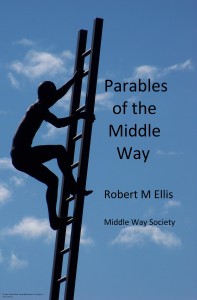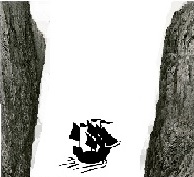“Let me show you a paradox“ said Dad. It was getting towards two thirds of the way of a long, boring train journey. They were sitting at a table in a carriage that was almost empty.
“What’s a paradox?” asked eleven-year old Laura. She was not too old to cease being almost constantly curious, but not too young for a slight note of potential detachment to be there as well.
“It’s a kind of puzzle where there’s a contradiction. If you take it one way, it makes sense, but if you take it another way, it doesn’t.”
“I like puzzles.”
“OK. This one is about a race. The race was between a Greek hero called Achilles, who being a hero of course could run fast as well as fight. And he was racing a tortoise. Who would you expect to win?”
“The hero!”
“Well, that’s what everyone else thought too. So to give the tortoise a chance they said they’d give him a head start. In fact they gave him a big head start. They worked out that the tortoise moved at about a tenth the speed of Achilles, so he needed a tenth of the distance to cover. Let’s say the race was 110 metres long, they put the tortoise at the 100 metre mark.” Dad drew a little diagram to show the set-up of the race.
“I still think the hero would win. Tortoises are so slow. He’d catch up with the tortoise in no time.”
“Well, Achilles did catch up pretty quick with where the tortoise was when he started. But by that time the tortoise had moved a little way forward. Not very far, but a little way.”
“Surely the tortoise didn’t win?”
“You’ll have to wait and see. Because after Achilles had caught up with where the tortoise was at first, he went a bit further and caught up with where the tortoise had been next.”
“So did he catch up with the tortoise then?”
“No, because the tortoise had moved a bit further ahead. Only a tiny bit further ahead, but still ahead. In fact, that happened every time Achilles caught up to where the tortoise had been previously. In the time it took Achilles to get to where the tortoise had been previously, the tortoise had moved ahead a little bit more.”
“But surely it got to be such a little bit that it didn’t matter any more?”
“Ah, but that’s where you’re wrong. Every little bit of distance, no matter how small, could be divided up a bit further. So every time Achilles caught up to where the tortoise had been, he was still a little bit ahead.”
“But that’s silly! The little bit ahead would start to be too small to notice. It would get so small you’d need a microscope to see it!”
“It would get even smaller than that eventually, but the tortoise would still be ahead of Achilles just an incy-wincy bit. So Achilles would never catch up with the tortoise.”
Laura made a face. “Is it true then? Is that what actually happened?”
“No, it’s what is called a thought experiment. You think something through and see what will happen when you think out the consequences. But it’s only when you think about it that Achilles would never catch up with the tortoise. If you got a real man and a real tortoise and got them to run a race like that, of course the man would actually catch up with the tortoise. So that’s why it’s a paradox. If you think about it one way, it’s true, but if you think about it the other way, it isn’t.”
“But how can it be true and not true at the same time? I don’t understand.”
“Well, here’s one way of understanding it. One half of your brain thinks it’s true and the other half thinks it isn’t. Our brains all have two halves: they’re called the left hemisphere and the right hemisphere. The left hemisphere thinks in terms of ideas of how things are, and works out what must be true just using those ideas. That’s like you do in maths when you work out a sum without having to count anything or relate it to real things. The right hemisphere, though, depends on the senses, and takes its ideas about what’s true from what we actually experience. For the left hemisphere, space and time are just ideas. You can chop them up as long as you want, and you just get a smaller and smaller number, regardless of whether you could actually see it or not. So for the left hemisphere, it makes sense to think that Achilles would never catch up with the tortoise. But for the right hemisphere that takes information from what actually happens, of course he would.”
“Silly left hemisphere!”
“Well, it’s not that silly. Remember you’ve got one too. In fact, half of you is the left hemisphere. It’s only silly when it works things out for itself and just assumes it’s got to be right, without consulting the right hemisphere. People get all sorts of silly beliefs that way. Like they think the world is going to end next week based on adding up the numbers of chapters in the Bible, or they can’t let go of a big plan they’ve put lots of time and money into even when it’s clearly going to fail, or they think sharks are going to come up out of the toilet and attack them because they’ve read about a shark attack in the sea.”
“That’s like serious silly!”
“Just keep consulting your right hemisphere as well as your left and you’ll be fine. Every time someone suggests a silly idea, give it a reality check.”
“So the tortoise didn’t really win the race?”
Dad shrugged. “Who knows? Apparently the race is still going on.”
******************************************************************************************
The left and right brain hemispheres
The relationship between our brain hemispheres, like everything about the brain, is complex, and for many years scientists have been right to be suspicious of over-simplifications. Nevertheless, generalisations can be made which are supported by a good weight of evidence. My understanding of this evidence is indebted to Iain McGilchrist and his important book ‘The Master and his Emissary’. The generalisations that can be made about the role of left and right hemispheres are especially useful, because they provide both confirmation of, and further insight into, the Middle Way and the reasons for it.
The division between right and left hemispheres is not entirely one of function, but rather of specialisation. To some extent the hemispheres can duplicate each others’ functions, like colleagues in distinct but related jobs in the same office. The two hemispheres are also not entirely separated: they communicate, but the question is how much. There is also an issue of power in the relationship, with the left hemisphere tending to over-dominate the right. That does not mean that the two hemispheres are not totally dependent on each other – they are more like an unbalanced marriage in which the husband over-dominates the wife (or vice-versa). Another common misunderstanding is that there are ‘left hemisphere’ and ‘right hemisphere’ types of people, but there are not. We are all left-hemisphere dominant, just some more than others, and all varying at different times.
The specialisations of the two hemispheres should also not be over-simplified to ‘reason’ in the left hemisphere versus ‘emotion’ in the right. Rather the left hemisphere specialises in representation – that is, in holding beliefs about the world expressed in language. Those beliefs are closely related to our goals, so the left-hemisphere is also the goal-driven hemisphere. In contrast, the right hemisphere is characterised by openness to experience: whether that is experience of what is happening beyond our bodies (through the senses) or within them. It is also the right hemisphere that provides a wider, more open perspective that can connect together the representative beliefs held by the left: thus it deals in metaphor, seeing relationships between ideas that would otherwise be kept apart.
The story of Achilles and the tortoise also draws our attention to another crucial feature of the different specialisations between the hemispheres – one that Iain McGilchrist drew my attention to, but does not seem to be widely appreciated. This is the differing ways in which the two hemispheres relate to time. The right hemisphere can actually experience time passing, but the left only has representations of time as a set of sequences. It is the left hemisphere that is thus responsible for impatience, as under its charge we want to jump ahead to the next goal-related event, and are incapable of experiencing mere process. The same disposition goes for space: the left hemisphere is concerned with points in space or ways of dividing it up using ideas, but not with the experience of space itself. Hence the ‘paradox’ of Achilles and the tortoise reflects a disjunction between the left hemisphere and right hemisphere ways of understanding things, and provides us with immediate access to our own experience of being able to experience things in these two different ways.
Laura’s robust common sense in calling the left hemisphere ‘silly’ tells us something about the moral value of this information and its relationship to the Middle Way and integration. The left hemisphere, as Dad points out, is not ‘silly’ per se, but only through being over-dominant or isolated from the right. It is the over-dominant left hemisphere that gets stuck in dogmatic or metaphysical beliefs, in isolation from the right hemisphere that could provide a wider perspective on those beliefs. The process of integration thus involves bringing that wider right hemisphere perspective to bear on the isolated representations of the left hemisphere, each of which tends to be accompanied by the assumption that it has the complete picture, and each of which may be associated with goals that we are pursuing. The Middle Way is recognising that each of our left hemisphere representations is not the complete picture – in other words avoiding the delusions of certainty, whether positive or negative.
The belief about the infinite divisibility of space and time expressed by the story of Achilles and the Tortoise has many of the typical features of absolutised or metaphysical beliefs of the over-dominant left hemisphere. Infinity of any kind can be conceived but not experienced or imagined, so it is the stock-in-trade of metaphysics. It ‘makes sense’ in its own terms and can be reasoned about, but only on the basis of assumptions that are merely conceptual. In that way, the infinite divisibility of space and time is a similar absolutisation not only to the outward infinity of space and time, but also to the infinity and perfection of God, or other claims of infinite scope such as determinism. Not all metaphysical beliefs involve infinity, but one can be fairly clear that beliefs about infinity are metaphysical. Oddly enough, they are also absolute because they are not incremental: you cannot have more or less of an infinite anything, as it is either infinite or it isn’t infinite.
Such metaphysical claims may or may not be true. The universe may or may not be infinite, and space and time may or may not be infinitely divisible. There is no way we could ever find out, as we would have to investigate infinitely to do so. Like other dogmatic beliefs, the problem is thus not that it is definitely untrue, but that it is beyond experience. The paradox was first put forward by Zeno (a different Zeno from the founder of Stoicism), which is why it is known as one of Zeno’s paradoxes, and strangely enough, Zeno seems to have taken it for granted that we would take the ‘rational’ conclusion based on infinite divisibility to be the true one. For him, the purpose of the story was to prove that it was reason that tells us the truth, whilst experience is deceptive. But quite different conclusions can today be derived from the same example.
 This story and commentary is one of the ones that can be found in ‘Parables of the Middle Way’.
This story and commentary is one of the ones that can be found in ‘Parables of the Middle Way’.



